What are you feeling hopeful about right now?
Share your thoughts by emailing editor@kenyon.edu.
16 reasons Kenyon alumni are optimistic about the future.
Story by Elizabeth Weinstein | Illustrations by Edmon Deharo
Looking back on the past year, it can be challenging to remember anything but the hardships we have endured.
From the big things — a deadly pandemic, an economic crisis and an overdue reckoning with systemic racism and oppression — to the daily stressors brought on by life in lockdown, there’s still so much left to process.
Yet scattered amid the chaos are seeds of hope.

“We can think about hope as a state of being,” explained Assistant Professor of Psychology Leah Dickens, a social psychologist who studies the functions of emotions in everyday life. “Hope can help us cope with our current situation because we believe that things will be better in the future.”
With that in mind, we asked alumni in fields ranging from environmental studies and clean energy, to emergency medicine and financial technology, what’s making them hopeful about real issues affecting our world. Here’s what they had to say about finding — and creating — hope in some unexpected places.
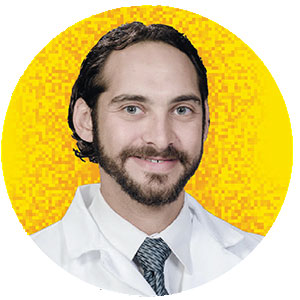
Bradley Dreifuss ’01 is the director of rural and global emergency medicine programs at the University of Arizona College of Medicine at Tucson, and a co-founder of HCW HOSTED, Inc., a nonprofit dedicated to supporting healthcare workers and their families during the COVID-19 pandemic and beyond. According to Dreifuss, “emergency medical and critical-care team members are canaries in the coal mine. When we are understaffed and overworked, when there is no staff to triage patients, when more and more patients are piling up at the emergency department door, the system breaks down, then people break down.”
Last June, the New York Times published an op-ed by Dreifuss, an emergency physician, titled “I’m a Health Care Worker. You Need to Know How Close We Are to Breaking.” He wrote the essay after finishing his ninth consecutive overnight shift at the hospital, at the peak of the pandemic’s destruction in Arizona.
“Seeing everything come to fruition that we had been warning against, and seeing what it was doing to my staff, I was like, ‘Okay, something needs articulating because no one’s talking about how we’re doing, or why we’re not doing well,’” he said.
The writing process itself was a “release” for Dreifuss, but the overwhelming expressions of solidarity and support he received from readers made him realize just “how important our social sciences and communication skills are for managing disaster situations.”
“During the COVID-19 crisis, we accomplished amazing scientific feats with record speed, but we failed when it came to communications, logistics and human behavior,” he explained.
To help ease the burden on health-care workers, he and his wife, Heather Dreifuss ’99, co-founded HCW HOSTED, a nonprofit whose mission is to build technology and community-based services that enable health-care organizations to ensure health-care worker, family and community well-being.
“I never realized what a resilience factor it is for people to feel like they’re making a difference,” he said of the volunteers and donors who have supported the organization, “When we build vehicles for people to get involved and try to make a difference, it points their anxiety in a useful direction.”
Going forward, he added, “I hope that we realize that the behaviors we model, and our actions, as well as our words, all have consequences, both positive and negative. I hope we move away our rugged individualism and realize that we’re all interconnected, and require a strong sense of health citizenship.”
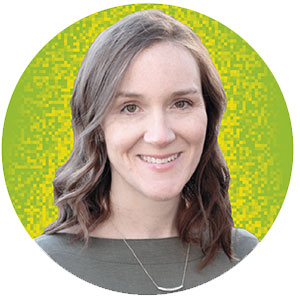 Victoria Hougham ’04 is managing director of Zero Abuse Project.
Victoria Hougham ’04 is managing director of Zero Abuse Project.
When Hougham began working as a clinical social worker 15 years ago, she noticed that organizations serving abuse victims and survivors were disconnected and siloed from other areas of social work.
One silver lining of the pandemic: “Now there is more of an understanding that preventing child maltreatment, creating work environments that are harassment-free, and believing and supporting loved ones who have experienced abuse is a responsibility for all,” Hougham said.
The need for collective responsibility is particularly relevant when considering child maltreatment cases over the past year, she explained. “The majority of child abuse and neglect reports come from mandated reporters such as teachers and doctors. Due to the pandemic, these professionals saw children much less frequently in person,” she added. “The welfare of children cannot rest solely on educators and medical professionals. Something that this past year has shown is how critical it is for everyone who intersects with children and goes inside homes (home inspectors, plumbers, faith leaders, etc.) to help protect children.”
Hougham is particularly hopeful about the strides being made in the child protection field. The pandemic has forced everyone to innovate and rethink processes and priorities. Technological capabilities in child protection efforts and support services for survivors continue to grow. “Over the past year we have learned that when our communities take steps together, we can collectively create safer spaces for our kids,” she said. “We all have a call to action to end child abuse in the U.S.”
Another cause for optimism is “an increasing understanding that widespread exploitation of children is not inevitable,” she added. “Child abuse can and will be ended, and the prerequisite innovation and hard work are well underway.”
3: “It has been gratifying to see the people I worked with during my 35-year career at the National Institutes of Health (NIH) become public health rock stars. I believe in their resolve to improve public health and applaud their hard work in a profession that by design brings up the next generation, grooming young scientists to carry the mantle.”
Kristin Olsen Kiser ’79 P’15, Chevy Chase, Maryland
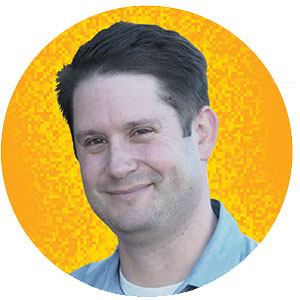 John Pitts ’02 is head of policy for Plaid — a data network that powers fintech tools — where he works to protect consumers’ rights to access and use their financial data.
John Pitts ’02 is head of policy for Plaid — a data network that powers fintech tools — where he works to protect consumers’ rights to access and use their financial data.
The last decade has seen an explosion of new financial technology (fintech) that, according to Pitts, is fundamentally changing the entire financial-services sector by “putting the consumer at the center of their own financial life.” Apps and services like Venmo, Betterment, Acorns and Square make it easier for consumers to handle their own banking, investing and spending with the ease of a computer mouse click or smartphone finger swipe.
These apps owe their existence to section 1033 of the Dodd-Frank Wall Street Reform and Consumer Protection Act, which passed in response to the 2008 financial crisis and gives consumers the right to access and share their financial information, Pitts explained. “It was such a huge, profound change, and no one realized it at the time,” he said. “It used to be that the bank controlled consumers’ finances, and they’d get whatever products the bank wanted to offer. If you wanted something else, you needed to move to a different bank.”
The future, Pitts believes, “looks like people who have traditionally been excluded from financial services actually being included, for real, in a way that they never have been before.”
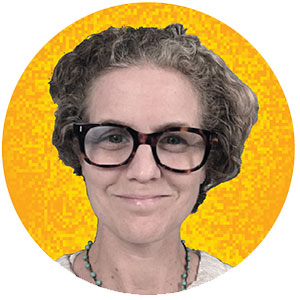 Liz Dunning ’99 is vice president of development for Brady United to End Gun Violence.
Liz Dunning ’99 is vice president of development for Brady United to End Gun Violence.
“My mom was shot and killed in 2003, when I was just 26. Her murder went unsolved for years,” Dunning said, describing the tragedy that upended her world. Her mother’s killer was finally identified in 2014, but not before he killed two more people. He was convicted on Nov. 2, 2015, and, in 2017, Dunning ran a marathon to honor her mother on what would have been her 70th birthday. She raised around $30,000 for Brady United to End Gun Violence through a campaign she called Run Lizzie Run.
She joined the team at Brady in 2019 and now leads fundraising efforts for the grassroots organization, helping connect donors with its public health approach to ending gun violence. As defined by the Centers for Disease Control, a public health approach consists of defining and monitoring the problem, identifying risks and protective factors, developing and testing prevention strategies and ensuring widespread adoption and implementation.
“We now have an incredible gun violence prevention champion (President Joe Biden) in the White House and gun violence prevention majorities in both houses of Congress,” she said. “This means that our federal lawmakers now are closer to mirroring the people they represent: 90+ percent of Americans want expanded background checks and roughly 60 percent believe we ought to ban assault weapons.”
Because of this, Dunning said she’s hopeful that “we’re closer than ever before to delivering a world that can grow safer and not more dangerous for the kids, including mine, who are growing into it, even as we work to ensure that the intersection of racial justice and gun violence is fully understood and expressed.”
Her mother’s murder, she added, was “an inflection point in my life — there is no path by which I reclaim the lightness of the person I was before. ... Honoring those we’ve lost with action might be the clearest definition of hope — that belief that we can create a better world.”
6: “Consumers today are much more engaged, empowered and connected with tools for direct protest and reform. There’s a long way to go, but Gen-Z’ers have grown up expecting businesses to be public with their ethics, or face the consequences.”
Tamsin Smith ’88, founder and president of Slipstream Strategy, San Francisco
7: “I believe consumers have a new appreciation for the food, beverage and hospitality industries. We never looked holistically at how fortunate we were to have so many experiential opportunities all around us, and then those experiences got taken away overnight. Hopefully now we will cherish all the hard work that restaurateurs and workers put in day after day to create places of gathering for all to enjoy.”
Bradford Reynolds ’07, chief financial officer of Blaze Pizza, in Pasadena, California
8: “We now have the biggest institutions in the world throwing money at our industry, saying, ‘Go faster!’ We’re going to wake up in five years and Americans are going to want more renewables, clean fuels and electric vehicles. And those will be their jobs, making those things.”
Sheldon Kimber ’99, founder and CEO of Intersect Power, of Truckee, California
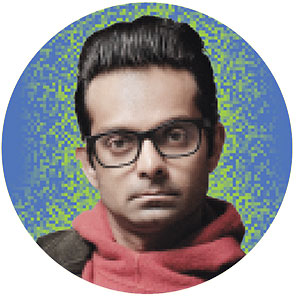 Atul Varma ’01 is lead engineer and “tinkerer” at JustFix.nyc.
Atul Varma ’01 is lead engineer and “tinkerer” at JustFix.nyc.
Varma first learned about New York City’s housing crisis by reading a 2017 article in the New York Review of Books. “I was really affected by that article because I just couldn’t imagine the idea of growing up in a household where we were being constantly evicted, unable to afford the rent and always having to move from place to place,” he said. “It seemed like this terrible tragedy, but I didn’t know what I could do to help.”
Varma realized that it’s easy for landlords to evict their tenants because they have access to websites that function like Amazon’s “one-click” shopping — like “one-click evictions” for landlords. And while it is possible for tenants to sue their landlord when a rental is not meeting basic safety standards, doing so involves a byzantine process, he explained.
In 2018, Varma started working for a small nonprofit startup called JustFix.nyc that was actually trying to address the housing crisis. Working closely with designers, engineers, housing organizers, tenant advocates and lawyers, Varma enjoys thinking about engineering in a way that extends beyond the question, “How do we do this as efficiently as possible?” It’s more important, he said, “to make sure that we are building the right things, and not just building the things right.”
When he started at JustFix.nyc, “landlords were doing lots of things that made it difficult for renters to hold them accountable,” he said. “There are laws in place in New York that give tenants rights, but the government doesn’t necessarily have the resources to enforce them.” Landlords have also found ways to evade detection, like hiding behind LLCs to make it seem like they only own one building, when they are actually part of a company that owns 80 buildings.
JustFix.nyc developed a tool called Who Owns What, where you can enter any address and quickly see everything else your landlord owns. It also created a tool that makes it easier for tenants to sue their landlords, leveling the playing field for renters, so to speak.
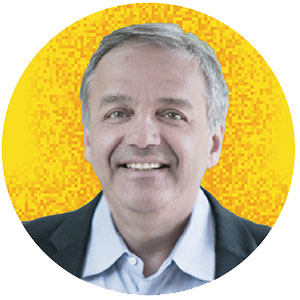 Giuseppe “Seppy” Basili ’83 is executive director of the Jack Kent Cooke Foundation.
Giuseppe “Seppy” Basili ’83 is executive director of the Jack Kent Cooke Foundation.
“I’ve always known the incredible work that historically black colleges and universities (HBCUs) do,” said Basili. “I didn’t understand all of the challenges they face.”
Recently, he has spent a lot of time learning more about how we can tackle systemic racism — “specifically, how hard it is for historically black colleges and universities to catch up to other institutions’ endowments,” he explained. “If you were to add up the endowments of every HBCU in the U.S., the total number would be less than the $1.6 billion that Michael Bloomberg donated to Johns Hopkins University in 2018 alone.”
The tide is shifting, however. Philanthropist Mackenzie Scott has made headlines by providing large grants specifically to a number of HBCUs, and in the corporate world, businesses like Duke Power and Walmart are stepping up and making financial commitments to support HBCUs. And, according to Basili, for the first time, the Jack Kent Cooke Foundation will be making philanthropic investments in leading institutions that graduate the largest number of African American STEM majors in the country.
“Usually when an event happens like the murder of George Floyd, there are protests and calls for change, but I haven’t always seen money flow in the same way,” he said. “This is the first time I’ve seen something really stick and have both groundswell support, and also institutional and foundational level support, at every level. It gives me great hope.”
Sources: UNCF, 2018 NCES fact sheet
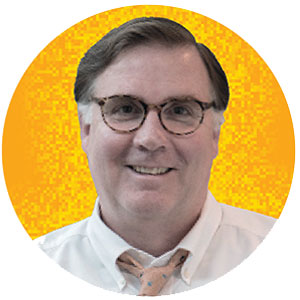 Andrew Richards ’79 is a clinical psychologist at Boston Children’s Hospital and co-manager of Boston House, a home-away-from-home for children with cancer and their families.
Andrew Richards ’79 is a clinical psychologist at Boston Children’s Hospital and co-manager of Boston House, a home-away-from-home for children with cancer and their families.
In his psychology practice, Richards works with “a lot of kids who have things like ADHD, anxiety and trauma, and all of those things really contribute to kids being distracted. When they’re in my office and are distracted, we can play a game of UNO or something like that while also having a conversation,” he said. “But with virtual therapy sessions, that’s certainly been a challenge. It’s forced me to get really creative. I went into doing virtual visits kicking and screaming, but in some ways it has been a real service to my patients.”
In the past, he noted, “a mom might bring her 9-year-old boy for therapy with me, but would also have to bring the 6-year-old brother and 3-year-old. They’d all take a train and a bus and then walk to the clinic, and then do it all over again going home. A 15-minute appointment could turn out to be a three-hour ordeal. The pandemic has made it much easier for families who I work with to get the care their kids need, and that’s a really good thing.”
 Emily Vincent ’02 is the founder of Facing Race in Arlington/White Folks Facing Race, in Arlington, Virginia.
Emily Vincent ’02 is the founder of Facing Race in Arlington/White Folks Facing Race, in Arlington, Virginia.
This past summer, nonfiction books such as “So You Want To Talk About Race” by Ijeoma Oluo, “How To Be An Antiracist” by Ibram X. Kendi, and “Waking Up White: And Finding Myself in the Story of Race” by Kenyon alumna Debby Irving ’83 consistently dominated the New York Times and Amazon best sellers lists. For many white Americans, it was a summer of awakening, or re-awakening, to the systemic racism and anti-Black oppression around them. And some, like Vincent, are helping guide others through the process. Vincent founded Facing Race in Arlington in 2017 as a way to connect community members who are working on becoming more antiracist.
“I had been doing my own self-work for several years and I hoped to find others in my community who were also interested in unlearning white supremacy together,” she said. “I was very pleased to find many others. I intentionally chose not to make the group an official organization because I could see that there were already existing organizations doing this important work and my goal instead was to help connect them to each other and to the broader community.”
Doing this work can be challenging, but she is motivated by her academic background in history, “which reminds me that humanity has survived and thrived in many dire situations in the past,” she said.
One of her favorite sayings that she uses with her kids all the time is, “You can’t eat an elephant all at once.” It applies to antiracism as well.
“Every little bite we take, every step forward, every new thing learned, every conversation with someone about this topic advances our progress.” Vincent said.
“Because I am white,” she added, “I know that I can choose to stop doing this work. Hope for me means sticking with the work even though my survival doesn’t depend on it, because my antiracist colleagues of color do not have the same choice.”
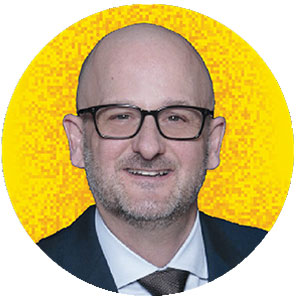 Lincoln Bleveans ’89 is executive director of sustainability and energy management at Stanford University. He has worked in the global energy industry for over 25 years, focusing on electric power and sustainability, and has had a front-row seat to the highs — and dramatic lows — of climate change. Yet, he’s optimistic that a cleaner, healthier future for our planet is within reach.
Lincoln Bleveans ’89 is executive director of sustainability and energy management at Stanford University. He has worked in the global energy industry for over 25 years, focusing on electric power and sustainability, and has had a front-row seat to the highs — and dramatic lows — of climate change. Yet, he’s optimistic that a cleaner, healthier future for our planet is within reach.
“The last four years have been incredibly frustrating in many ways, but the silver lining is that when you look at the adoption of renewable energy, there’s barely a hiccup,” Bleveans said. “The pace of innovation has not slowed down at all and that tells me that there’s momentum, which comes out of knowledge and passion, and it is unstoppable. That gives tremendous hope that we can do this.”
He’s convinced that the energy industry “is going to change more over the next decade than it has in the last century, not the least in terms of humans’ interactions with energy,” he said, because “renewable energy used to be at the edge of the conversation and now it’s fundamental — it’s at the center of the conversation.”
Bleveans predicts that electric vehicles will become less expensive and easier to use. As more customers switch from gas to electric cars, production of greenhouse gases will tumble, creating what he calls a “virtuous cycle” that directly improves our quality of life.
“Imagine if you took 90% of internal combustion engine vehicles and made them electric,” he said. “Public health outcomes for neighborhoods near freeways would get so much better. Less affluent residents’ economic outcomes and health outcomes would improve; their kids would perform better in school, and, without the noisy drone of engines all the time, their property values would increase.”
Over the next 10 years, he sees “renewable energy just becoming energy, and electric vehicles just becoming vehicles,” he explained. “I think we’re rapidly going to get to a point where we don’t have to use the adjectives anymore.”
Hope, he added, drives us forward: “Without hope, there’s no reason to innovate — to work on something now that isn’t going to bear fruit for years, decades or centuries.”
14: “In my university, we are working toward requiring all students to take coursework that focuses on race and racism, similar to other requirements related to developing quantitative and writing skills. For me, hope means helping students see and challenge their own biases, and educating students on how to be antiracist.”
Zornitsa Kalibatseva ’08, assistant professor of psychology at Stockton University in New Jersey
15: “There’s something really special about the residential college experience. We know it is transformative. We know it works. And it has become increasingly important to me to figure out how we can bring this education to spaces where it hasn’t been.”
Adrienne Amador Oddi ’09, dean of admissions and financial aid at Trinity College
 Rowana Abbensetts-Dobson ’13 is the founder of Spoken Black Girl Publishing.
Rowana Abbensetts-Dobson ’13 is the founder of Spoken Black Girl Publishing.
When a teenage Abbensetts-Dobson was first diagnosed with anxiety and depression, she struggled to find resources, on or offline, that reflected her experiences as a Black woman navigating these conditions.
Fact: According to the Anxiety and Depression Association of America, Black Americans are 20% more likely to experience serious mental health problems than the general population.
After graduating from Kenyon, Abbensetts-Dobson worked in the publishing industry and “came to realize that publishing has a long track record of having diversity issues,” she said. “I was inside discovering where some of these issues were coming from — why there was such a lack of representation.”
So she started a blog, Spoken Black Girl, where she wrote about mental health — including her own struggles with depression and anxiety. Spoken Black Girl became the container for her writing career, as well as its own business, where she publishes stories and hosts workshops on mental health, wellness and self-care, centering on stories of women of color.
Over the past decade, she said, younger voices have joined the conversation, and they, especially, are helping dismantle the stigma around talking publicly about mental health.
“Millennials and Gen-Z folks tend to be really progressive on mental health,” she said. “Social media has made it very accessible — almost trendy — to talk about mental health and self-care in a way that’s not stigmatizing. And over the past couple of years, the wellness industry has really taken off in a lot of ways. So I think there’s a profit side to it as well.”
The uncertainty of 2020, Abbensetts-Dobson added, has inspired many people to reflect on what they really want from life and how they can improve. “One of the first things that people turn to is improving their mental health,” she said, “because without that, it’s really hard to improve on anything else.”
Bryan Doerries found comfort in the ancient Greek tragedies he studied in college. Here’s how he has helped thousands…
Read The StoryA record-breaking gift helps Kenyon enrich its residential experience.
Read The Story